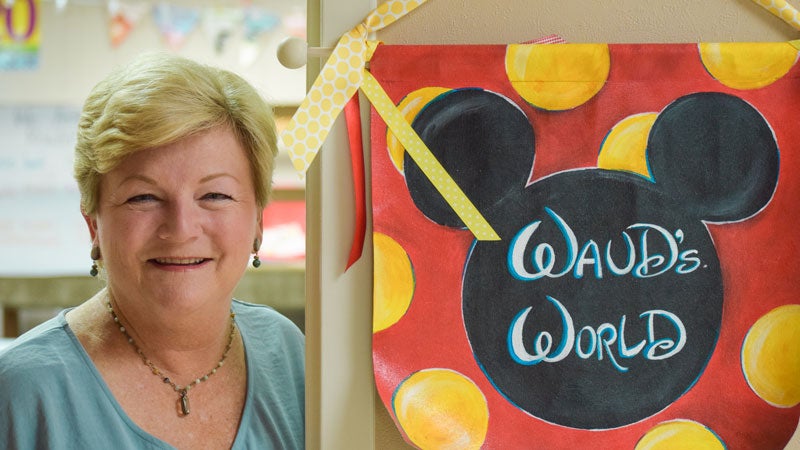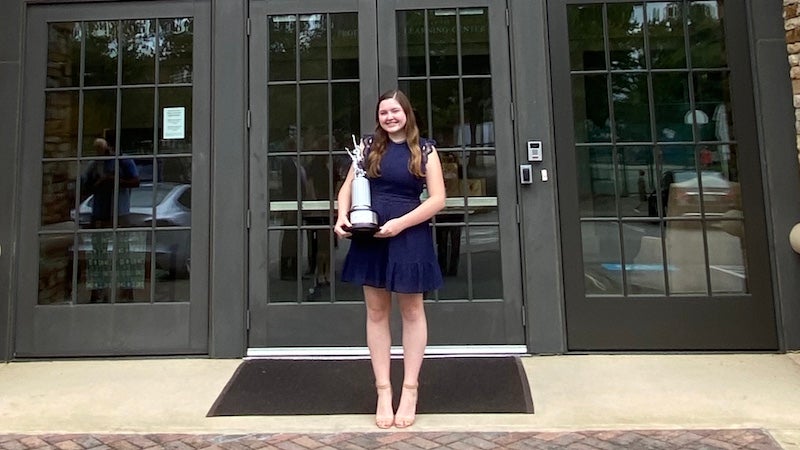By Anna Grace Moore
Photos by Mountain Brook Schools & Contributed
From April 25-May 4, 2023, nine robotics teams from Mountain Brook Junior High, Brookwood Forest Elementary and Crestline Elementary together competed at the VEX Robotics World Championship IQ Challenge, which was held at the Kay Bailey Hutchinson Convention Center in Dallas, Texas.
Brought to competitors by the Robotics Education and Competition Foundation, the VEX IQ Robotics Competition involves student-led robotics teams who design, build and compete their robots in challenge demonstrations. This year, the competition’s challenge, Slapshot, featured students having to design and build a robot that could tilt, push and spin discs underneath a bar into different scoring zones for points.
As the students progress throughout the school year, so do their robots. While the challenge remains the same, the students will through trial and error advance their robots to overcome obstacles and improve in efficiency as they compete against other teams.
Robotics teams in Alabama will compete in local tournaments, and if they win in their divisions, they will advance to the state tournament which is held each year in Auburn. If teams qualify for advancement at the state level, they will go on to compete at the world championship, which is quite exclusive.
This world-wide competition is composed of more than 40 different countries’ teams. Crestline Elementary STEM teacher Amy Anderson says that each year, around 8,000 robotics teams from around the world will register for qualifying tournaments, but only 800 teams advance to go to the world championship. The top one percent will place and win awards.
Mountain Brook City Schools is the gold standard for robotics teams in Alabama, according to James Salvant, who was hired by the school district to jumpstart the robotics programs more than 10 years ago.
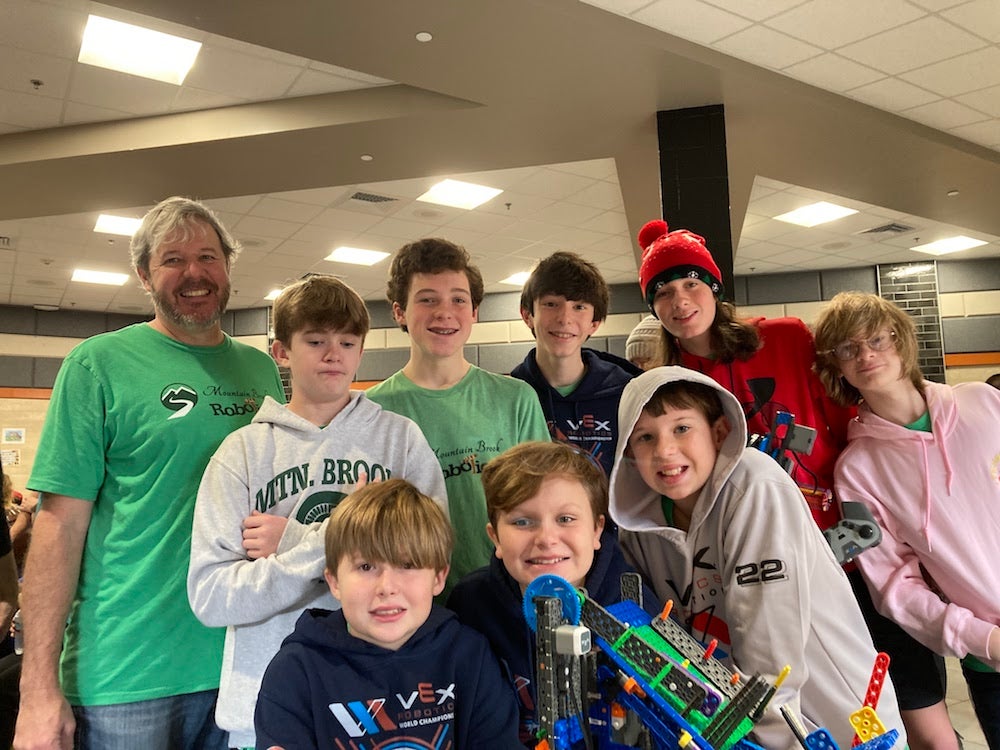
“We started with 20 kids across the district, and when I left, we had almost 200 students involved in all five schools,” James says.
Mountain Brook wasn’t always the leading school system for robotics programs. In fact, the program started because one mother offered her basement for a handful of James’s students to meet after school and work on their robotics projects.
As time went on, James began taking students to competitions and helping them navigate the road to success. Soon, James was taking those same teams of students to other schools to teach others how to develop and implement STEM and robotics programs into school curriculums.
Mountain Brook City Schools slowly gained world-wide recognition for the district’s growing robotics programs, which is unique in that students as young as 5 and 6-years-old are getting hands-on experience with VEX products.
“We chose VEX because of its continuum,” Amy says. “In kindergarten and first grade at Crestline, we use these very simple robots that help teach kids how to give step-by-step directions.”
These young students are learning how to tell robots directions such as left from right, which helps them develop a sense of direction for themselves. The school system has also embedded a language arts curriculum with robots, where students will drive robots to pick out certain letters in sequence frequencies to spell basic words. Not only are these students enjoying playing with robots, but they are also learning how to spell, kinesthetically.
VEX products range from elementary-age to college-level designs, meaning these curriculums can be taught at any age level.
“Computer coding is a language,” Amy says. “Just having the kids learn another way to communicate broadens their thinking. That takes a lot of problem-solving skills. That’s one reason we feel STEM at the elementary level is so important.”
Teaching STEM at a young age has proven to help students excel later on in life.
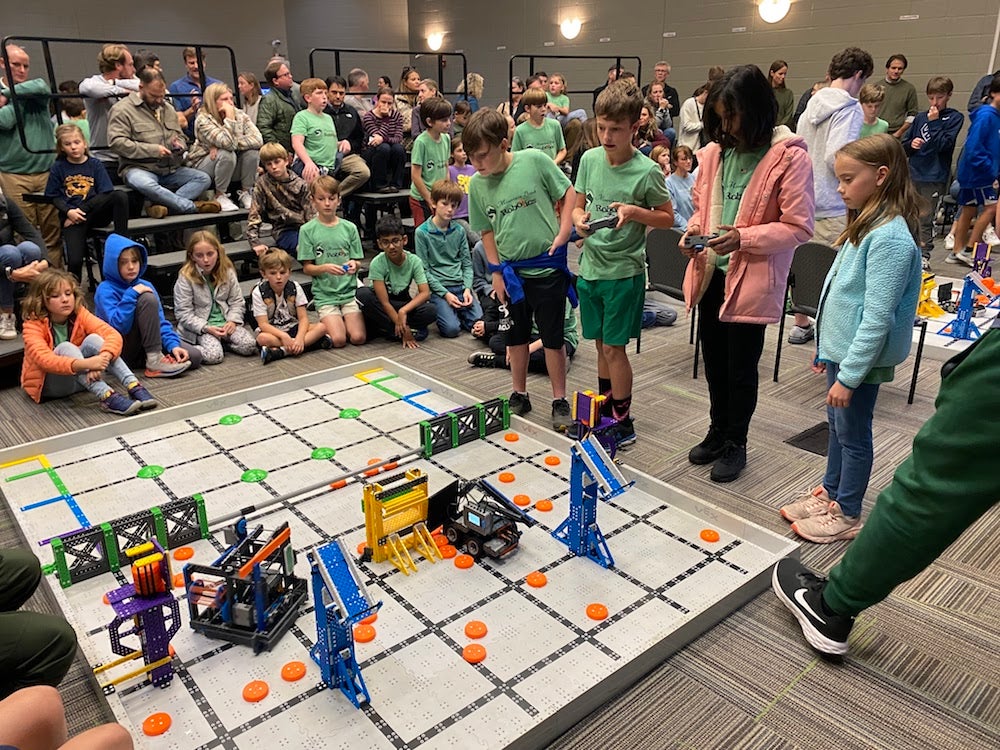
“I’ve had students go to [ivy leagues] and get in just based on what they learned in robotics,” James says. “One young lady wrote her essay on how robotics changed her life and what it meant to her.”
Mountain Brook today has 40 different robotics teams and hundreds of students competing across the district.
Two Brookwood Forest Elementary teachers, Sharon Mumm and Jennifer Jinnette, got to witness three of their teams qualify for the world competition this year.
“One of our teams, “Banana Juice,” was a first-year team, and they made it to the division finals,” Sharon says. “Another team of all girls, “Omni Girls,” did really well. They did a poster design, and their design won for the entire world competition.”
One Brookwood Forest student, Evalee McClellan, helped design the poster for her team last year, and her team won first place. She helped her team win in the design competition this year, too.
“Our third team, “Blue Wolves,” started in their fourth-grade year during Covid,” Sharon says.
The Blue Wolves actually began practicing robotics in one of their homes since in-person teams were not yet allowed to compete. Everything they built, they competed with virtually. The team ended up winning first place at the state level that year.
During this year’s competition, the Blue Wolves faced a difficult challenge when one of their robot’s pieces snapped in two. With only minutes to recover, the team problem-solved and rebuilt the robot on the spot.
“They ended up getting third in their division [at the world championship],” Sharon says. “We are really proud of them.”
Jennifer says that every robotics team in Mountain Brook City Schools has one common thread: that is, they demand a standard of excellence achieved through having a good attitude, communicating and above all, working together as a team.
Referring to the Blue Wolves, Jennifer says, “They are a great example of what robotics can do for children.”
Robotics is a global phenomenon. At the world competition alone, 45 states and more than 40 countries were represented.
“We had kids competing with kids from China, Indonesia, Paraguay, Australia, New Zealand–all over the world,” Amy says.
When asked how Mountain Brook has earned such a credible reputation, Jennifer was quick to credit James for the program’s success.
“He has been so instrumental in making this program so good,” she says. “He is phenomenal with children. Robotics is authentic learning, and it’s really great to see.”
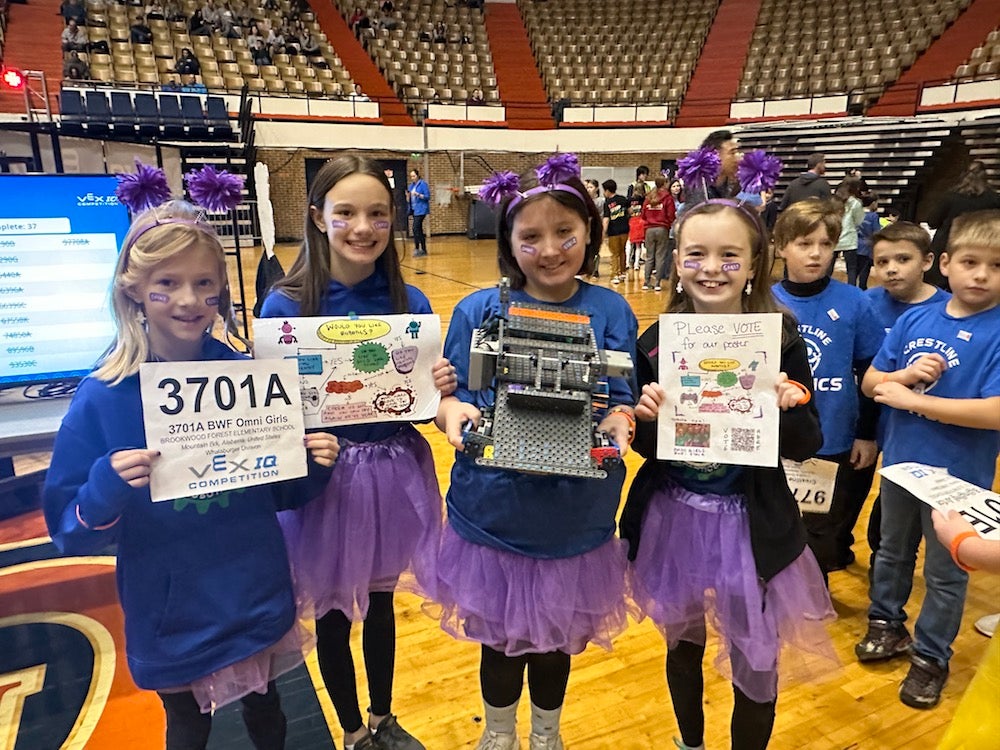
Amy and Sharon agree that James spearheaded this mission more than a decade ago, and the program would not be where it is today without him.
“He’s done a great job of mentoring us to keep the program going,” Sharon says of James’s work.
While James has relocated to work in another school district, he says his heart for serving students through skills-based robotics programs hasn’t faltered. He believes these skill sets students learn will translate into any career path they might choose.
One of James’s favorite sayings in robotics is “we’re all failures here, and that’s okay.”
His belief is that robotics teaches the “fail forward” method, meaning overcoming rejection first begins with accepting failure but never defeat.
“If we’re not failing, we’re not innovating,” James says. “Nobody comes in here and is an expert on day one. I want students to be open to failing. It builds confidence.”
It’s beliefs like these that make James stand out as an educator, and Mountain Brook City Schools will forever be thankful for the lessons he taught to students throughout his career.
If a legacy is built through failing forward, James Salvant is the model example for all students to follow.




